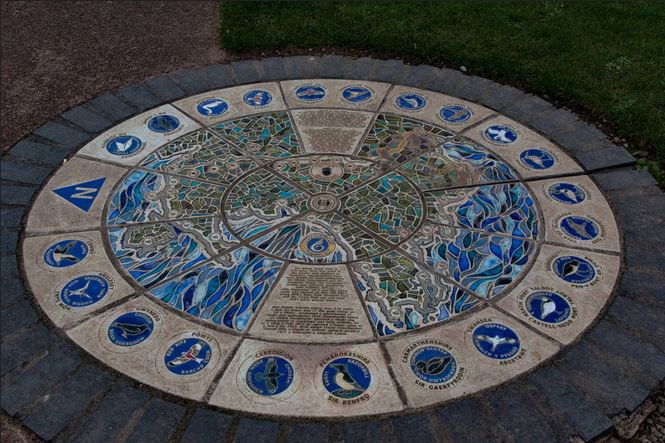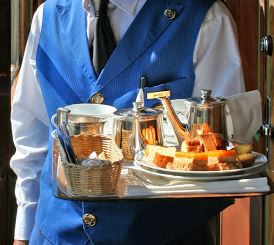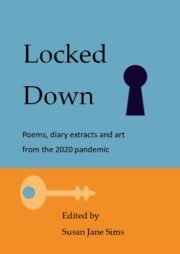
Photograph – Sue Sims
Editor: Nick Cooke
Poems by
• Archive of all Poetry Space showcases
Editor’s overview
I didn’t start out with any specific set of sought-after qualities, but was particularly struck by poems that made an impression I thought likely to stay in the memory longest, sometimes through vivid imagery, sometimes via a note of inner conflict or ambiguity, particularly at the end. I was also interested by the number of influences from other poets, some of them very well integrated into the work so as not to detract from its originality.
Evensong
Twilight tiptoes in, scatters summer-shadow kisses
across a sallow, play-worn lawn. Frail sunlight needles
silk through hazy, apple-puzzle leaves. Birdcall vespers
salute a genuflecting willow touching-down upon
a Monet-ponded setting-sun. Sol’s final-rays spear speckled
green; splash sapling, shrub and shut-down flower-head.
Dusk-flies fire-cracker-dance among nodding border flora.
Glass-twilight shatters into mottled iridescent-shards where
wound-up, free-range garden-children shadow-play, swing
back and forth from moon to house-light time until,
like their ousted feathered friends, they’ll flutter home
and rerun all their busy days in edgy imitation dreams.
Mike Lee
Close Encounters
I’ve had George Clooney
on the tip of my tongue.
If he’d stayed there much longer,
I’m sure I could have made something of it.
Trouble is, he’s married, but right now
I have the morals of a Hogarth cartoon,
yet this is no laughing matter.
I have even tried toy-boying around
with the likes of Robbie and crew.
Problem there was his grinning tended
to put me off, right at the wrong moment.
Not to mention jumping on the bed, dancing
and screaming let me entertain you.
Not very dignified at my age.
Of course, I know you’ve tried
spinning around with Kylie.
But when you were licking my nipples,
I always felt like I should role play
that the cancer had been in my breast,
not in my bowel. As for Angelina,
that was twice as bad.
Maybe we’re not doing this right,
should keep these names to ourselves.
That way I get to play the field
with the entire Welsh rugby squad,
not to mention getting jiggy with the physio
and the bloke who drives the coach.
And his missus come to think of it.
Pat Edwards
The Disconnect
You were not to blame, Mum.
I must have been difficult.
Rebellious, attention-seeking, opinionated.
How else could a physically fit child
attract the attention lavished
on a polio-disabled sister?
You and I were to battle for forever;
I married an Irishman instead of
the local lad you liked so much
and my man listened for forty years
to you telling him,
Diane could have married anybody.
But I know you loved me
and we’d have our moments in the car
on Pendennis Point, overlooking the sea,
when I’d read aloud my latest short story.
Your eyes would tear-up at a sad ending
and you’d lavish praise,
encourage me to write more stories –
always hoping there’d be a book
you could show off to your friends.
In your old age, I slid your nightie
over your head, seeing for the first time
the breasts that fed me.
I never loved you more
than I did in that moment.
Di Coffey
At odds
We rarely saw eye to eye,
me, the rebellious daughter,
bookworm, too keen on boys,
she, the prim and proper mother
who liked things just so,
wore hats, expensive shoes, put
all her energies into being
Dolly Brown, the dentist’s wife.
She lived by a tight set of rules.
One afternoon I made a face
behind her back (or so I thought)
just as she was showing off
our new bathroom, all in citron
the height of fashion, yellow
suite, yellow blinds, yellow walls
with seagulls on. She ordered me
upstairs to await punishment.
Visitors gone, I heard steps
on the stairs, the door opening.
Take down your knickers!
I knew what was coming – a
slapped bottom, at which
my mother was a dab-hand –
not this time, I fled downstairs,
into the back garden, out the gate.
To be fair, she never again
tried to hit me. We settled for
an uneasy truce. I remember
standing behind her as, in old age,
she looked in the mirror, ran
sad fingers over the wrinkles.
I was sorry for her, Poor Mum,
I said and kissed her. Now
I’m the woman with a lined face.
Moira Andrew
Decisions
We were strangers yesterday.
You were celebrating the interview of a lifetime.
I was tree-bound backwards on a sledge.
You never did start the job and I was six months late for dinner.
Now two accidents later we are side by side.
The Intensive Care Unit.
Hospital beds, IV drips, life support, shell-shocked families.
Fighting the same battle against our own bad luck.
Surrounded by vacant lost souls,
all of us pointlessly debating decisions,
that meant we came here rather than home.
Sleep punctuated by things that go beep in the night.
Morning handovers and the next dose of bad news.
Fearful of being released into the unknown.
Waiting for wounds to heal,
that neither of us can be sure ever will.
Stephen Lightbown
Park Warden
He built.
He painted.
He mended.
He kept it clean.
He was the park.
The brown bark that clothed the trees.
The blue water that kept the secrets.
Many a party was held where he worked.
He was always the help and never the guest.
This is where he wanted to be.
Where he will stay when all that is left is ash.
His desire to work,
was an illness for which he sought no cure.
His legacy will outgrow the trees.
His ask was small.
The park was his home.
He knew every blade, bench and bird nest.
Yet his name we would never learn.
The aging grounds were his sanctuary.
But when he fell to his knees it was to dig not to pray.
Decades of toil had done their damage.
He gave himself so the park could grow.
He was the park.
This was his pension.
This was his life.
We never said thanks.
Not even a plaque.
The park was him.
Stephen Lightbown
Pastel Beach
The silver haired couple walk along the beach, fingers entwined.
Their matching pastel shorts, one blue pair, one pink,
shimmer with what I assume is water from a recent brisk dip in the cold sea.
But I can’t be sure as I only see them now for the first time.
They speak to each other, their words lost amongst the orchestra
of a thousand languages battling for supremacy with a wood-pigeon concerto.
I watch as their hands break free, her hand from her hand.
Returning from the horizon a yellow kayak momentarily sits.
Tired from its battles, allowing the swell to gently caress it home.
Heading back towards the shore and its similarly coloured comrades.
Sun weathered goalposts; a single life buoy straddling the watchtower;
the weatherproof tarp that sits on top of the small white dinghy dressed for dinner;
the beaks of the beach birds tentatively disturbing the lipstick tipped cigarette butts;
and the beach itself, waiting to provide a grainy embrace to the yellow kayak.
Stephen Lightbown
Through Camomile
The taste of camomile I sip,
The perfume of camomile that I inhale,
The yellow globes of camomile I tread upon…
Beyond the farm gate, a rough track hurtles
Downhill to granite rock-falls below—
In Woody Bay and Martinhoe:
Through sweet-slashed hay stalks cut and stacked,
Over tousled, bleached wheat stubble
To gouged cliffs, to clumps of thrift
Alive in mid-air, thriving on sea mist.
Now the pathway bends
To a far-off burned-out sun.
Knee-deep in western twilight
I wade under a pearling sky for yards
And miles through camomile.
My sandals bruise out the daisies’ secret scent:
Subtle, blunted by salty air.
Yellowing to autumn, their downy fronds and feathers
Skim my skin, white-petalled heads gleaming,
Luminous as little moons, crushed, then rising
Under my hushed and reverent feet
While I go slowly, slowly
As if I would drowse,
As if I would forever dream.
Soft camomile eclipses even setting suns
And rising moons: even the streaming in of seas.
Camomile carries me across the miles again to sleep in ease.
Lizzie Ballagher
The Scent of Air
Dark, red, so deep under the skin
It’s almost cornflower blue, almost violet;
Poppy red, this blood is salty, scarlet
When it meets the air.
Yet oxygen has no colour, no taste, no fragrance
(Or so my gas engineer has told me).
Still, why should I trust the science?
For when we hung from open windows
Or clung to crumbling pathways
Or swung on the rungs of Jacob’s Ladder
On Derbyshire’s peaks and peat-lands where bees worked
Through honeyed heather whole mountainsides below—
All air in our lungs smelled sweet as nectar and we grew giddy, drunk
With the laughter of it on our faces.
So, how can I believe mere science?
For when we walked the dizzy cliffs
Of Mawgan Porth and Bre Pen Farm,
Or crags above the black Bedruthan rocks,
We smelled again that pure, sharp, clear perfume
Of air washing like an ocean over the long Atlantic,
Bursting milky white as lilies over granite stacks.
Oh, you may say air has no aroma.
But it’s the silky scent of air
That drives my hot red blood,
That lets me breathe,
That fills my head, my hands, my heart.
So will it do till my cooled and burnt-out ash
Is scattered like petals on a vagrant wind.
And then shall I be
One with the beat of blood between my children’s bones,
One with those gorgeous flowers in the fields,
One with the scent of air.
Lizzie Ballagher
A Charm of Goldfinch
after ‘Still Life with Game Fowl, Fruit and Vegetables’, Juan Sanchez Cotan, 1602
Someone had to string these apples, one
for each day of the week, hang three lemons
in the top left corner, tie the charm of goldfinch
to their bamboo cane, overlook tiny beaks
of grief, ripe smell of partridge, arrange
feathers to provoke a memory of cobalt sky.
The room behind distilled into negative space –
an ink black sea into which fall the artist, his wife,
the cook who scrubbed carrot, radish, cardoon
white as ivory, threw soiled water into the street.
One moment saved as if nothing could be more itself.
And outside, echoes of fish-market, dry woods,
acres of orchard where no one can keep up
with the speed of lemons falling.
Rosie Jackson
Editor’s comments
Evensong
Though the compound adjectives might seem a little overdone, the imagery is deft, vivid, evocative and often electric. The clear Hopkins influence is well managed and most of the related effects come off well, particularly the alliterations and flickering rhythms of ‘Sol’s final-rays spear speckled /green; splash sapling, shrub and shut-down flower-head’.
Close Encounters
A sassy, rollicking celebration of female sexuality, suggestive of early Fran Lock, which will certainly remain long in my memory, undercut as it is by the sudden shock of the bittersweet cancer reference laced in with erotic memories. A nice tongue-in-cheek twist at the end, too.
The Disconnect
A tender family drama shot through with the emotional paradoxes of mother-daughter relations, and a terse admission of guilt-ridden sibling jealousy intriguingly thrown in. The narrative details are concise and carefully chosen, and the simple, heartfelt ending may seem too ‘basic’, but draws power and ambiguity from the enjambment and the necessary pause after ‘more’, with its hint of ‘any more’.
At Odds
Different treatment of a similar theme to that of ‘The Disconnect’. I liked the way the ‘prim and proper’ mother is quickly exposed as being something of the opposite – violent and punitive – but compassion wins out over spite, before a possible slide into sentimentality is halted by the ambiguous final line. Is this simply an acknowledgement of old age, or a hint that they’re no longer at odds, as the daughter now sees life through her mother’s eyes?
Decisions
A brief but cogent exploration of the nature of chance and coincidence, with two people brought together in hospital by simultaneous accidents. The theme is elegantly and delicately handled. I particularly liked the humour of ‘things that go beep in the night’ and the thought-provoking fact that the ‘wounds’ that might never heal could be emotional as well as physical.
Park Warden
A quietly effective, deceptively simple paean to an unsung hero that eschews all pretension and artifice, making its point with sure-minded incisiveness. The poet rightly corrects any impulse towards sentimentality by making clear the warden was a workaholic whose disproportionate commitment ultimately cost him his life, thus raising some interesting questions about the price to be paid for selfless dedicated toil.
Pastel Beach
This seemingly ekphrastic poem may appear wordy, even at times overloaded, but the super-long lines have a mesmeric effect, like the slowly lapping waves, and swell of the sea, whose movement they enact. I enjoyed the almost buried hint of the idyllic scene being subject to human ruination in ‘the beaks of the beach birds tentatively disturbing the lipstick tipped cigarette butts’, where the alliterative ‘b’s suggest the relevant bobbing movement.
Through Camomile
I interpreted this beguiling nature poem as a homage to the pre-eminence of smell and taste as against the more frequently lauded other senses, though those also feature. I certainly ended up wanting to make a strong cup of camomile tea and inhale its soothing aromas. I also admired the dramatic, Wordsworthian counterpoints to the lulling sensation, in ‘a rough track hurtles/Downhill to granite rock-falls below’ and ‘blunted by salty air.’
The Scent of Air
Again, this impressive nature poet summons the drug-like power of smell as the dominant force in an often synesthetic fantasia of the senses, building up to a Dylan-Thomas-influenced lyrical crescendo. There’s another hint of Wordsworth in the ‘then shall I be’, where the inverted word order implies a hidden question, as in ‘As high as we have mounted in delight/In our dejection do we sink as low’. (‘Resolution and Independence’)
A Charm of Goldfinch
This one definitely is ekphrastic, and the poet has done a fine job of bringing Cotan’s work before us. Vividly intense, with a concentrated power born of close observation and imaginative excitement, the poem manages to maintain its focus despite the ambitious switch from the images themselves toward speculation on the human stories behind them, which if less concise might have proved an unwanted diffusion of energy.
About the editor
Nick Cooke has had over fifty poems published in a range of outlets, including two anthologies. His poem ‘Tanis’ won the Wax Poetry and Art Contest in Summer 2016 and ‘Process’ was Highly Commended in the Segora Poetry Competition in 2015. He is currently completely his first collection, entitled Inventing the Will, in addition to working on a range of novels, stage plays and film scripts. He has also had a number of short stories published and regularly reviews poetry for online magazines such as London Grip and The High Window Journal.







